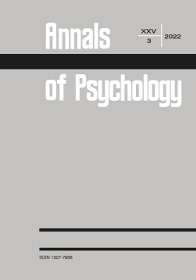AFFECTIVITY AND SELF-FORGIVENESS.
THE ROLE OF CONTROL OF NEGATIVE EMOTIONS: SHORT REPORTa*
AFFECTIVITY AND SELF-FORGIVENESS.
THE ROLE OF CONTROL OF NEGATIVE EMOTIONS: SHORT REPORTa*
Author(s): Justyna Mróz, Kinga KaletaSubject(s): Cognitive Psychology, Personality Psychology, Psychology of Self
Published by: Towarzystwo Naukowe KUL & Katolicki Uniwersytet Lubelski Jana Pawła II
Keywords: positive affect; negative affect; self-forgiveness; control of emotions; anger control;
Summary/Abstract: Self-forgiveness is a process in which emotions, thoughts, and behaviours towards oneself are changed from negative to neutral or positive. In this study, we examined affectivity and emotional control (of anger, depression, anxiety) as emotional factors promoting or discouraging self-forgiveness. We examined self-forgiveness among Polish adults (N = 380, Mage = 36.26). Respondents completed the Polish version of the Positive Affect Negative Affect Scale, the Courtauld Emotional Control Scale (CECS), and the self-forgiveness subscale of Touissant’s Forgiveness Scale. In our cross-sectional study, we tested the moderating role of emotional control in the relationship between affectivity and self-forgiveness. Our results showed that positive affect was positively correlated with self-forgiveness, whereas negative affect was inversely correlated with self-forgiveness. Additionally, emotional control (anger, depression) was negatively correlated with self-forgiveness. Finally, total control of emotions and control of anger were found to be buffers between negative affect and self-forgiveness, the effect of negative affect on self-forgiveness being weaker among individuals who were more anger-controlling. The obtained results are a prelude to further research into the relationship between affectivity and self-forgiveness.
Journal: Roczniki Psychologiczne
- Issue Year: 25/2022
- Issue No: 3
- Page Range: 239-249
- Page Count: 11
- Language: English

